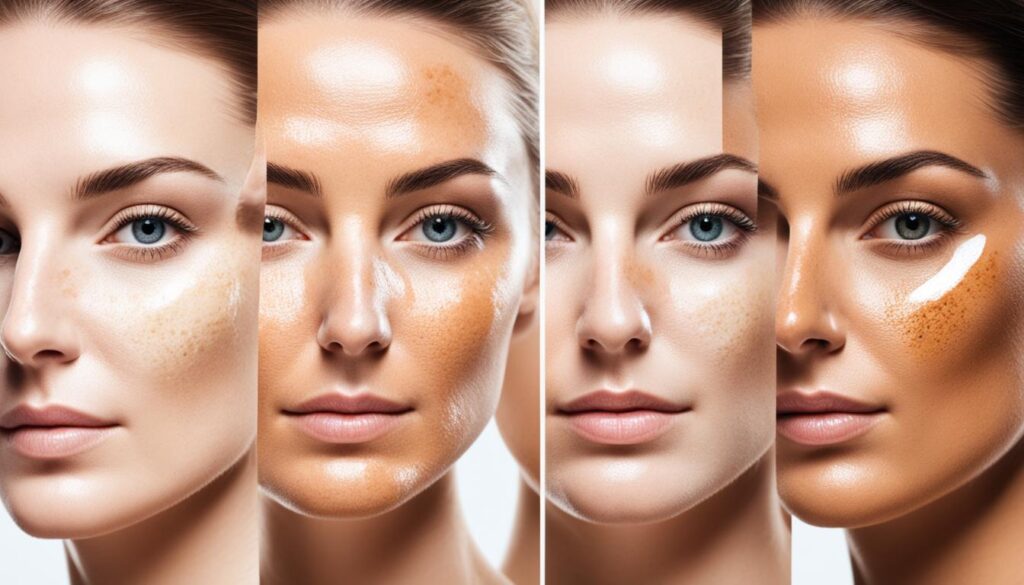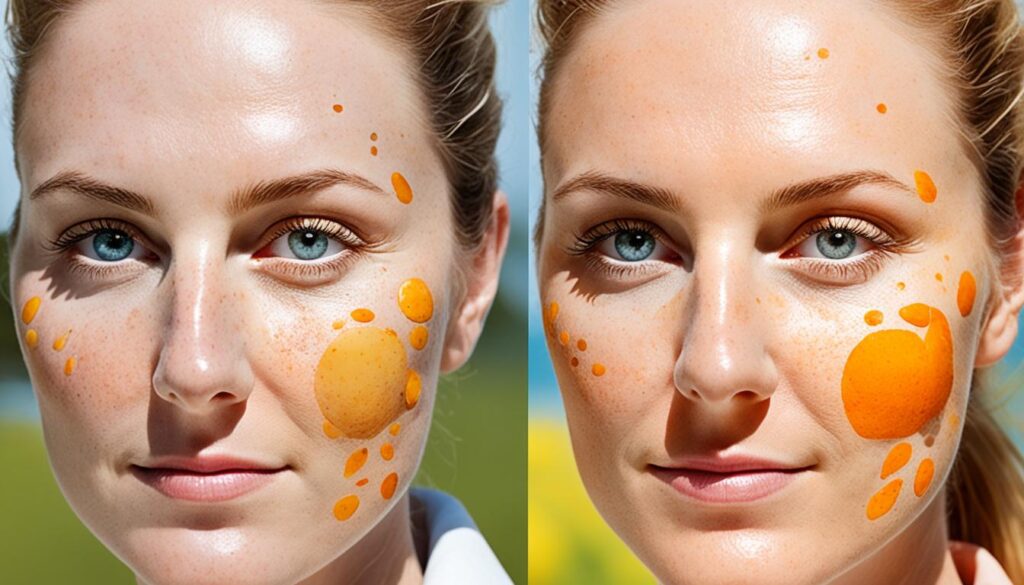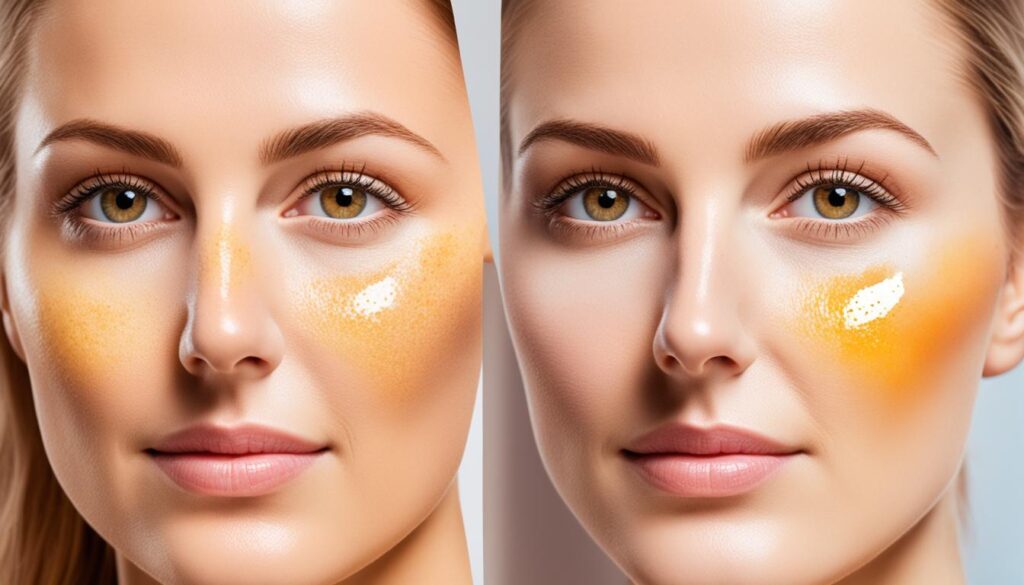Did you know that hyperpigmentation affects millions of people worldwide? It’s a common skin problem where some skin areas darken. This can cause the appearance of dark spots or patches. It can be from the sunlight, hormones, inflammation, or injuries. Commonly, it affects how confident a person really feels and their general happiness.
In the pursuit of smoother, more even skin, vitamin C and retinol have become skincare stars. They are both antioxidants that can help fade dark spots and boost skin tone. But the big question remains: which is better for your skin?
This article will compare the effects of vitamin C and retinol on dealing with hyperpigmentation. We will certainly consider their benefits and how they function, assisting you select the best for your skincare. Let’s find out the reality and the ideal way to get radiant, glowing and flawless skin.

Key Takeaways:
- Hyperpigmentation is a common skin condition characterized by the darkening of certain areas of the skin.
- Vitamin C and retinol are two popular ingredients used to treat hyperpigmentation.
- Both vitamin C and retinol can help fade dark spots and improve skin tone, but their efficacy may vary depending on individual preferences, skin type, and the severity of hyperpigmentation.
- It is important to consult with a dermatologist to determine the best course of treatment for your specific skin needs.
- Consistency and patience are key when incorporating vitamin C or retinol into your skincare routine.
>>Get your secret guide here<<
Understanding Hyperpigmentation and Its Causes
Hyperpigmentation makes some parts of the skin look darker than the rest. It shows up as melasma, PIH, or age spots.
Melasma happens due to hormonal shifts, like in pregnancy or from some medicines. PIH comes from skin damage or acne issues. Age spots come from being in the sun a lot and from UV harm.
Being in the sun a lot can make hyperpigmentation worse. The sun’s rays make the skin’s melanocytes work more. This results in more melanin and can make dark spots darker and cause new ones too.
Let’s look closer at what causes hyperpigmentation, from each type to the things that bring about the colored spots on our skin:
Types of Hyperpigmentation:
- Melasma: Hormonal changes, like in pregnancy or from medicines
- Post-inflammatory hyperpigmentation (PIH): From skin inflammation or damage, such as acne
- Age spots (solar lentigines): Due to long exposure to sun and its UV rays
Common Causes of Skin Discoloration:
- Hormonal changes
- Skin damage or inflammation
- Exposure to the sun over time and UV harm
It’s key to know the types and causes of hyperpigmentation. This helps in choosing the right treatment. Dealing with the main cause and good skin care can lower skin discoloration.

The Role of Vitamin C in Skin Care
Vitamin C is vital in skincare. It’s a strong antioxidant that shields skin from harm and fights hyperpigmentation. We’ll look at how it defends the skin against damage and lowers melanin levels.
Antioxidant Benefits of Vitamin C for Skin
Vitamin C works as a powerful shield against free radicals. These unstable molecules can harm our skin cells, leading to aging. Sun exposure, pollution, and more create free radicals. Vitamin C fights them, keeping your skin healthy and young.
It also boosts collagen, the skin’s support system. This means fewer wrinkles and lines, helping your skin stay elastic and firm. As a result, your skin looks younger.
>>Get your secret guide here<<
Vitamin C’s Effect on Melanin Production
Melanin gives our skin, hair, and eyes their color. Too much melanin can cause dark spots and uneven color. Vitamin C lowers melanin production, making your skin tone more even.
It can fade dark spots and stop new ones from forming. This also makes your skin brighter. Its skin-brightening qualities help enhance your skin’s look.

Adding vitamin C to your routine is great for hyperpigmentation. Its antioxidant and melanin-reducing effects are what your skin needs to battle dark spots and look even. Just remember, the quality and stability of the vitamin C in your products matter. Choose products from trusted brands with solid research behind them.
Retinol: The Dermatologist Recommended Ingredient
Retinol is highly recommended by dermatologists for treating hyperpigmentation. It comes from vitamin A and is a key part of many skincare routines. Its known for its ability to fade dark spots and make skin look better.
How Retinol Works to Fade Dark Spots
Retinol boosts cell turnover, helping get rid of dead skin cells. This action stops the build-up of melanin, which causes dark spots. It also uncovers new, brighter skin by peeling off the old layer.
Retinol Benefits for Pigmentation and Skin Texture
Aside from tackling dark spots, retinol is great for skin texture and pigmentation. It makes your skin make more collagen. This can make your skin more stretchy and reduce wrinkles. So, it helps you have smoother, younger-looking skin.

Also, retinol smooths your skin by making pores look smaller and rough areas softer. It makes your skin tone more even too. This means it can fade acne scars and other dark spots.
Try starting with a low retinol dose in your evening skincare. Then, little by little, you can use more as your skin gets used to it. Always wear it at night. It can make your skin extra sun-sensitive.
Using retinol can aid in fading dark spots and enhancing skin texture. But, it’s not for everyone, especially if your skin is super sensitive. Talking to a dermatologist is a good idea. They can help you decide what’s best for your skin.
Read Also: Applying Niacinamide in the Morning and Retinol at Night? Here’s How.
Comparative Analysis: Vitamin C or Retinol Better for Hyperpigmentation
When looking for ways to treat hyperpigmentation, vitamin C and retinol often come to mind. Studies have looked at how well these ingredients help with dark spots and improving skin tone.
They found that both vitamin C and retinol do a good job.
Vitamin C is a strong antioxidant. It shields our skin from UV radiation and fights off pollution. It also stops melanin production, which fades dark spots and evens out our skin.
Retinol, on the flip side, is a form of vitamin A. Dermatologists often recommend it for hyperpigmentation and other skin concerns. It boosts cell turnover, sloughs off dead skin, and increases collagen. This not only fades spots but also makes skin look and feel better.
>>Get your secret guide here<<
Choosing between the two depends on your skin type and how severe the condition is. Some might lean towards vitamin C for a more even skin tone. Others could choose retinol for its exfoliating and collagen-boosting power.
It’s key to know what your skin needs and maybe chat with a dermatologist. They can help steer you towards the best choice for you. Always remember, what’s best varies for each person.

Integrating Vitamin C and Retinol into Your Skincare Routine
To fight hyperpigmentation, adding vitamin C and retinol to your skin care is key. They work together to fade dark spots and even your skin tone. But, knowing when and how to use them is vital for the best results.
Vitamin C should be used in the morning. It shields your skin from UV rays and pollution. Retinol, though, works best at night. This scheduling ensures they both work without issue.
You can also use vitamin C and retinol together for better effects. A good way is to use them on different days. Try vitamin C in the morning and retinol at night. Or, you can put vitamin C first and then retinol. Let each fully absorb for the best outcome.

But, not everyone’s skin likes vitamin C and retinol together, especially if it’s sensitive. If you feel any irritation, stop using these. Talk to a dermatologist for advice personalized to your skin needs.
By adding vitamin C and retinol correctly, you can beat hyperpigmentation. Use them with care to avoid skin issues. Slowly add them to your routine. This way, your skin gets used to them, and you’ll get brighter skin in the end.
Topical Treatments: Choosing the Right Hyperpigmentation Solution
There are many options for dealing with hyperpigmentation on the market. You can choose from serums, creams, or spot treatments. Each type focuses on removing dark spots and making your skin tone more even. Picking the best one for you means looking at a few important things.
Ingredients: The main thing to check in a treatment is what it’s made of. Good choices include vitamin C, retinol, and niacinamide. These can fade dark spots, brighten the skin, and even it out.
Concentration: How much of the good stuff is in the treatment makes a big difference. Higher doses work better but might irritate sensitive skin. So, start low and go slow if your skin is easily bothered.
>>Get your secret guide here<<
Formulation: Not all treatments work for every skin type. If your skin is dry, go for something with extra moisture. Creams or moisturizers could be your best bet. But if your skin is oily, look for serums or lightweight gels to avoid making it greasier.
Compatibility: Think about what your skin can handle. Sensitive skin might not like certain ingredients, like retinol. But niacinamide is good for many skin problems, including redness and acne.
Keeping these points in mind when shopping can help you find the right treatment. Remember, it takes time for these products to show results. Being patient and using them regularly is important. If you’re not sure which to choose, it’s best to talk to a dermatologist for personalized advice.
Hyperpigmentation Remedies Beyond Vitamin C and Retinol
There are more than just vitamin C and retinol that can help with dark spots. Adding certain ingredients to your routine can make your treatment more effective. They bring extra benefits to help you fight hyperpigmentation.
Niacinamide, or vitamin B3, brightens your skin and reduces dark spots. It stops melanin from reaching your skin’s surface. This gives you a more even and lighter complexion.
Kojic acid, from mushrooms, blocks melanin production. It fades dark spots and evens skin tone. This leaves your skin looking brighter and younger.
Licorice extract aids in reducing dark spots too. It cuts down melanin production. This extract also soothes and helps with skin conditions related to hyperpigmentation.
Alpha arbutin is strong in skin brightening. It stops the melanin-making enzyme, tyrosinase, from working. This ingredient improves skin tone without causing irritation.
Natural remedies like lemon juice can also work. It’s known for its bleaching effect on the skin. Aloe vera is great for skin calming and moisture. Turmeric helps by reducing hyperpigmentation with its antioxidant and anti-inflammatory benefits.
Before trying new ingredients, always do a patch test. This checks for any bad reactions. It’s wise to see a dermatologist first, especially with sensitive skin or skin issues.
Skin Brightening Products: Safety and Efficacy Considerations
Choosing safe and effective skin brightening products is crucial. We must be careful about what we put on our skin. Consider these points when picking out such products:
- Quality Testing: Pick products that have passed strict quality tests. Such products meet safety standards and are free from harmful stuff.
- Formulation: Look at the ingredients to make sure they are stable. This stability is key for the product to work well over time.
- Positive Reviews and Testimonials: Before you buy, look up reviews from reliable sources and users. Good reviews show the product has worked well for others.
- Consult with a Dermatologist: If your skin is sensitive, talking to a dermatologist first is a smart move. They can help pick out products that suit your skin.
Remember, safety and effectiveness are linked. It’s important to choose skin brightening products that put your skin’s health first. By keeping these tips in mind, you can pick products that will make your skin look its best.
Potential Side Effects of Vitamin C and Retinol Use
Vitamin C and retinol are usually okay to use. But, they might cause skin issues like redness or dryness sometimes. It’s smart to know how to handle these effects well.
>>Get your secret guide here<<
Common Skin Reactions and How to Counteract Them
You might notice minor skin reactions when using vitamin C or retinol. These could be things like redness, dryness, or irritation.
- Redness: Some folks see a bit of temporary redness after applying vitamin C or retinol. To reduce this, try using a moisturizer that soothes the skin.
- Dryness: Both vitamin C and retinol can make your skin dry. Keep your skin hydrated by using a moisturizer that’s right for you.
- Irritation: You might feel itchy or a bit of a sting from vitamin C or retinol. If so, stop using it for a bit or use it less often.
When you add vitamin C or retinol to your skincare, go slow. Increase how much or how often you use it over time. Follow what the product tells you. Don’t use too many new things all at once, that could upset your skin.
When to Consult a Dermatologist
If skin problems don’t go away or are really bad, see a skin doctor. A dermatologist will check your skin and figure out what’s causing the issue. They can give advice just for you. They might also tell you to use different products or change how you use them.
| Side Effects | Vitamin C | Retinol |
|---|---|---|
| Redness | ✓ | ✓ |
| Dryness | ✓ | ✓ |
| Irritation | ✓ | ✓ |
Celebrity Endorsements and User Testimonials: Setting Realistic Expectations
Celebrity endorsements and user testimonials can sway our skincare product choices. This is especially true for products that treat hyperpigmentation. When a famous person or someone we know shares a good experience with a product, we might hope for the same results. Yet, knowing that results can differ is key.
Skin type, how bad the hyperpigmentation is, and sticking to a skincare routine really matter. Even if a celebrity backs a skincare line or a user says it worked for them, remember your skin is unique. What helps one person may not help another because each of us may have different underlying causes for hyperpigmentation.
It’s smart to look at celebrity endorsements and user testimonials carefully. They can offer insights and introduce us to new products. But, we should use this info alongside other research and facts. This helps us keep our expectations realistic.
For hyperpigmentation, talking to a dermatologist is wise. They can check your skin’s needs, offer expert advice, and recommend the best treatments. Remember, getting clearer skin takes time and knowing what to expect is important for your journey.
The Science of Skin Pigmentation and Topical Treatments
The Anatomy of Skin Layers and Pigment Cells
To understand how topical treatments work, let’s first look at skin pigmentation. Our skin has three layers: epidermis, dermis, and subcutaneous tissue. The epidermis, the top layer, shields us from harm. It includes the outer layer we can see and feel, called the stratum corneum.
Inside the epidermis, special cells called melanocytes make melanin, the pigment that defines our skin color. Different factors, like our genes, hormones, and sunlight, control melanin production. Too much melanin in some places causes dark spots and an uneven skin tone.
Knowing about skin layers and how melanin is made helps us understand why hyperpigmentation happens. This knowledge is key to making effective treatments.
>>Get your secret guide here<<
How Topical Agents Affect Hyperpigmentation
Topical treatments work by interrupting melanin production and its spread. They might stop melanin production, break it down, or speed up cell renewal. This can fade dark spots and make the skin tone even.
Vitamin C, kojic acid, and licorice can slow down melanin production. This makes dark spots lighter and stops new ones from forming.
Retinol and alpha hydroxy acids (AHAs) speed up the skin shedding process. This removes layers with uneven pigmentation, showing brighter, even-toned skin.
Knowing how these treatments work can guide our skincare choices. It helps us pick products that truly tackle the problem of dark spots.
| Layer of Skin | Function |
|---|---|
| Epidermis | Protects the skin from external factors, contains melanocytes |
| Dermis | Provides structural support and houses blood vessels, hair follicles, and sweat glands |
| Subcutaneous Tissue | Provides insulation and cushioning |
Advancements in Dermatology: New Treatments on the Horizon
Emerging Ingredients for Hyperpigmentation Treatment, Technological Innovations in Skincare
Dermatology is always getting better. Experts work hard to find new ways to treat skin problems, like hyperpigmentation. With new knowledge about skin health, they are changing how we fight discoloration.
New ingredients show a lot of hope in tackling hyperpigmentation. Things like special extracts, peptides, and compounds can make skin clearer. These finds could change how we treat hyperpigmentation and help those looking for answers.
Tech innovations are also making a big difference. There are now devices that use light and lasers without any surgery. These new tools target skin issues, giving great results with few side effects.
There’s a lot happening in dermatology now, especially for skin discoloration. Thanks to new ingredients and tech, treating hyperpigmentation is looking bright. The future could bring ways to get rid of skin discoloration and have beautiful, even skin.
Lifestyle Factors: Enhancing Skincare with Healthy Habits
Topical treatments are great for dark spots, but our habits matter a lot too. Eating well, working out often, and guarding skin from bad elements are key. They help keep our skin looking and feeling its best, smooth and even.
Role of Diet and Exercise in Skin Health
Eating balanced meals filled with vitamins and minerals is vital for your skin. Think fruits, veggies, whole grains, and lean meats. These foods boost skin healing and fight off damage. And don’t forget to drink plenty of water to keep your skin soft and moist.
>>Get your secret guide here<<
Not skimping on exercise does wonders for your health and glowing skin. Moving more pumps more blood to your skin, which brings fresh oxygen and nutrients. This makes your skin look vibrant. Plus, working out can help you stress less, which is a win for your skin, too.
Protecting Skin from Environmental Stressors
Stuff like UV rays, pollution, and rough weather can cause spots and skin to age early. To defend your skin from these menaces:
- Use a sunscreen every day that’s SPF 30 or stronger, rain or shine. And slather on some more every two hours when you’re outside.
- Put on clothes that shield you, like long sleeves, hats, and shades, when the sun’s out bright.
- Try to avoid being in the sun too much between 10 am and 4 pm, the peak UV hours.
- Work on keeping your living space clean and steer clear of heavily polluted areas to dodge bad air.
When you follow a healthy routine and keep your skin safe from bad outdoor stuff, your skincare products do even better. You’ll have a brighter, more even skin tone to show for it.
User-Friendly Skincare: Making Informed Product Selections
There are so many skincare products out there. Picking the right ones for hyperpigmentation can feel hard. It’s important to make smart choices to get the skin results you want. Thinking about what’s in the product, what the product does, and what your skin needs can help you find great items.
Knowing what’s in your skincare is key. Get to know ingredients like vitamin C, retinol, niacinamide, and kojic acid. These can help with dark spots. Make sure these good ingredients are high on the list.
Also, check for things that might irritate your skin. This can stop bad skin reactions.
Don’t believe every big claim. Phrases like “miracle cure” or “overnight results” sound great. But, it’s best to be careful with these. Look for products that explain clearly what they do. And read what others say about the product. This can show if it works well on similar skin types.
Think about what you really need for your skin. Everyone’s skin is different. Whether your skin is sensitive or dry affects what will work. Pick products that fit your skin’s unique needs and your care routine. For instance, if you like something light, choose a serum. But if your skin is dry, go for thicker creams.
Choosing the right products smartly can make your skincare routine better. Always give your products time to show results. If you’re unsure, or want advice just for you, see a dermatologist. They can help with advice that’s right for your skin.
Conclusion
Vitamin C and retinol are both excellent for treating hyperpigmentation. They help fade dark spots and make your skin tone even. But, choosing in between them depends on what you like, your skin type, and how bad the issue is for you.
Talking to a dermatologist is important to get the best advice for your skin. They will look at your skin and recommend what could help. Then, they can help you make a plan that works just for you.
Being patient and sticking to your skincare is very important. It might take a while to see big changes. But, if you use your products regularly and follow what the experts say, you will get there.
Remember, getting clear, even skin is a process. With great products, recommendations, and a strong plan, you can fight hyperpigmentation. Then, you can have the skin you dream of. I used the Vitamin C serum and retinol serum from the minimalist brand and got better results. If you want, click this link.
FAQ
Is vitamin C or retinol better for treating hyperpigmentation?
Vitamin C or retinol? It depends on what your skin likes and how serious the dark spots are.
What are the types of hyperpigmentation and their common causes?
You might see melasma, PIH, or age spots. Melasma is linked to hormones. PIH comes from skin damage, and the sun causes age spots.
Why does sun exposure impact the appearance of dark spots?
The sun makes your dark spots worse. UV rays tell your skin to make more pigment, which darkens the spots.
What are the antioxidant benefits of vitamin C for the skin?
Vitamin C is great at fighting skin damage. It shields you from bad stuff like UV rays and pollution.
How does vitamin C affect melanin production?
Vitamin C stops too much pigment from being made. This can light up dark spots and make your skin tone even.
How does retinol work to fade dark spots?
Retinol makes your skin get new faster. It pushes out old skin, boosts collagen, and makes dark spots look lighter.
What are the benefits of retinol for pigmentation and skin texture?
Retinol not only fades dark spots but also smooths your skin. It makes more collagen and helps your skin renew faster.
How do vitamin C and retinol compare in clinical studies for treating hyperpigmentation?
Research says both vitamin C and retinol can help. They can make dark spots less visible and improve your skin’s look.
How should I integrate vitamin C and retinol into my skincare routine?
Using vitamin C and retinol together can give good results. But you must use them right to avoid skin problems.
What factors should I consider when choosing a topical treatment for hyperpigmentation?
Think about what’s in the product, how strong it is, how it’s made, and if it works well with your skin.
Are there other skincare ingredients that can help treat dark spots and hyperpigmentation?
Yes. Niacinamide, kojic acid, licorice extract, and alpha arbutin can make your skin look brighter.
Are there any potential side effects of using vitamin C and retinol?
Sometimes vitamin C and retinol might make your skin red, dry, or irritated. Knowing what to do can help.
Can I expect the same results as celebrities or other users when using skincare products for hyperpigmentation?
Your results may not be like others. It depends on your skin, how bad the dark spots are, and how well you care for your skin.
How do topical treatments interact with the skin to target and minimize hyperpigmentation?
Topical treatments get rid of dark spots by treating what causes them and blocking too much pigment from forming.
Are there any new advancements in dermatology for treating hyperpigmentation?
The dermatology world keeps getting new ideas and products for dark spots. There’s hope in the new treatments and technologies.
What role do lifestyle factors play in achieving clear and even-toned skin?
Eating well, staying active, and protecting your skin from the sun and pollution help you have beautiful skin.
How can I make informed product selections for hyperpigmentation?
Know what the product has, look at its claims, and think about what your skin needs. This helps you choose the right one for you.